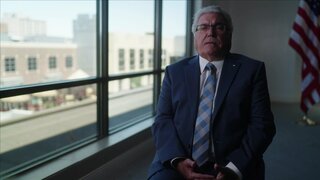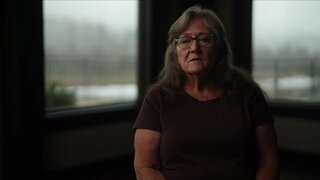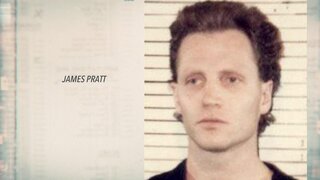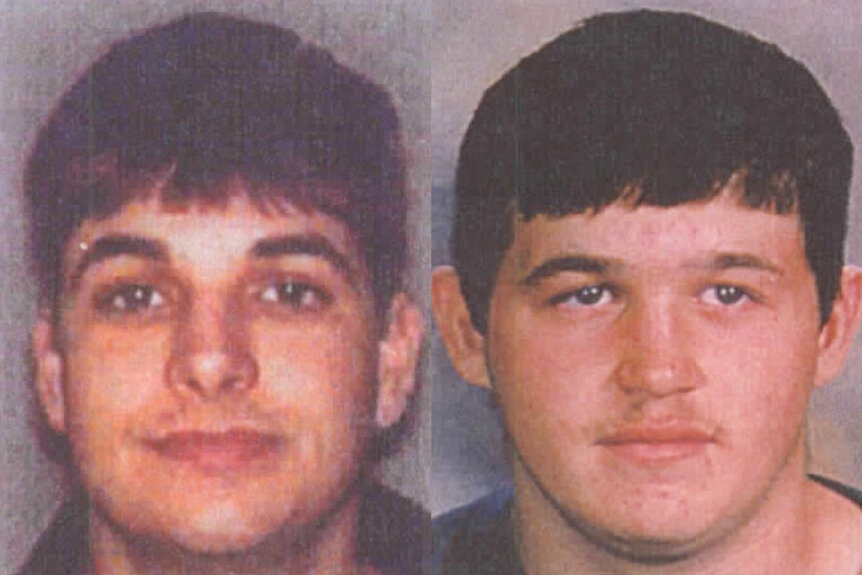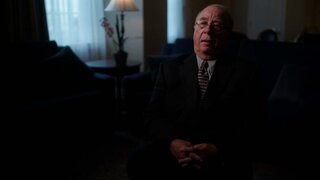Create a free profile to get unlimited access to exclusive videos, breaking news, sweepstakes, and more!
Iowa Stepbrothers Go On Disturbing Crime Rampage That Ends In 2 Murders And A Bank Robbery
Jamie McMahan and Chris Kaufmann needed cash to fuel their meth habit — so they came up with a horrifying plan that included betraying a friend.
Mahaska County seems like a peaceful, quiet place.
"This is rural Iowa," Michael Berrier, an officer with the Iowa Division of Criminal Investigation, told "Killer Siblings," airing Fridays at 8/7c on Oxygen. "Murders don’t take place and banks rarely get robbed.”
His colleague John Quinn echoed Barrier's sentiments.
"Mahaska County, it is one of the safest counties in the state of Iowa," he told producers. "It’s just filled with good people, Iowa people. They call it ‘Iowa nice.’”
But in 1997, a vicious crime spree proved things aren't always "Iowa nice" here.
On June 11, 1997, police were contacted by a farmer and landlord, Joe Hollop, in the town of What Cheer, Iowa. His employee-tenant, Barb Garber, 52, had — unusually for her — not shown up for work that morning. When police went to her home shortly after 9:30 a.m., they found the door unlocked and Garber, sitting in a chair with her breakfast in reach, shot twice in the head and twice in the chest.
Investigators found .22 caliber shell casings nearby and noted her green Ford pickup truck was missing. A neighbor said that they'd seen a strange car in Garber's driveway around 5:15 a.m., leading police to speculate that there were two suspects involved.
As the police were just beginning to investigate Garber's murder, they heard over the radio that the Gibson Bank, just eight miles away, had been robbed of $65,000 by two white men in ski masks and coveralls shortly after 10:00 a.m.
Nobody thought it was a coincidence.
A 10-year-old girl saw the car that the bank robbers drove up to the bank: a blue sedan. It was neither the unfamiliar gray station wagon seen in Garber's driveway at 5:15 that morning, nor her truck.
But there are only three roads in or out of Gibson, and a search by deputies along those roads found the sedan, abandoned on a gravel road off of one of them. The officer who found it recognized it as belonging to Gibson resident Island Schultz, 18.
By 11:00 a.m., the deputy, Quinn and other officers were at Schultz's residence, unsure if she was a participant or a victim but, in Quinn's words, "very concerned for her safety and welfare."
They were right to be: Schultz's body was found in her living room. She had been shot both in the back of her head and her forehead. There were .22 caliber shell casings on the floor.
"I have never believed in coincidences and having one homicide in a small rural area in a five-year period is unusual," said Berrier. "Having two murders and a bank robbery all within a circle of eight miles? At this point, we knew we were dealing with the same people."
A neighbor had seen a green pickup truck parked outside the home around 9:30 a.m.
The police held a press conference to explain the crimes to the public on the afternoon of June 11, and immediately got a tip from a man who saw resident Jamie McMahan driving the pickup that day, which he was certain the unemployed 22-year-old could not afford.
McMahan and his stepbrother Chris Kauffmann, 18, were familiar to the local police: Mahaska County Sheriff Chief Deputy Paul Degeest called them "typical teenage boys."
McMahan's mother and Kauffman's father got together in 1979 and eventually married. The boys grew up together in Oskaloosa, Iowa — a city of then about 10,000 people around 25 miles from the aforementioned crimes.
"We had a group of about 30 kids who ran the streets together," Nikki Loffredo, a childhood friend of the boys, told producers. "We were like a bicycle gang. We were terrors.”
Both Lofreddo and former Des Moines Register reporter Kirsten Scharnberg-Hampton told "Killer Siblings" McMahan was the outgoing, charismatic (and attractive) older brother, while Kauffman was a quiet, non-athletic kid in their circle that Loffredo described as a "dweeb."
"These two stepbrothers were starting to develop a closer relationship," said Scharnberg-Hampton. "But both of them were in bad places and it was really just a recipe for disaster."
Kauffman had just graduated from high school with apparently few prospects and a group of friends who "ran the streets," and McMahan had recently lost his job at a local plant. By the start of the summer, the 22-year-old McMahan was hanging out with 18-year-old Kauffman and his high school -age friends, and both, according to Lofreddo, were doing drugs.
State investigators went to the boys' home the following day, shocking their parents, who said they didn't know much about McMahan's friends, but knew he had been hanging out with Kauffman often.
The friends they did know were contacted and told police something the parents weren't aware of.
"In the last year, the two brothers started getting into meth," Lofreddo explained. "All kids that I knew in the town of Oskaloosa were either on it, making it, selling it. And if you didn’t, you were far and few between.”
In addition to learning about the brothers' drug use, police learned that McMahan had borrowed a friend's gray station wagon in May and returned it on June 11. McMahan had borrowed but not yet returned the same friend's .22 caliber handgun.
Authorities announced on June 12, after matching the shell casings in Garber's and Schultz's murders, that the boys were suspects.
Schultz's family and friends knew them both: Her best friend, Amanda Fenton, said they were friends with McMahan, and even Schultz's grandmother, Sonja Schultz, had met him.
Then, on June 13, two local families contact police: Their 16-year-old daughters had been missing for several days, and the parents were sure they were with Kauffman and McMahan. That was confirmed by a subsequent tip from a local hotel employee who'd seen the boys with two girls at the hotel around the time of the murders. He said they'd arrived in a gray station wagon, but the boys came back to pick up the girls in a green pickup truck.
On June 21, the girls' parents called back: Their daughters had returned home safely. In interviews with police, the teenage girls said that they had "partied" with McMahan and Kauffman at the hotel on the night of June 10. The boys left in the morning but picked them up around noon in a green pickup truck — and with a bunch of cash. The boys wanted to drive to Florida and check out the theme parks with the two teenagers.
For several days, McMahan and Kauffman spent the cash "like crazy," said Quinn — but by the time the foursome got to Disney World in Orlando, the girls wondered how they'd actually come by so much money. When they asked, McMahan told them that he'd robbed a bank and two people had been killed. That disturbed the girls so much they said they wanted to go home.
Instead, McMahan dropped the two off in an orange grove in nearby Kissimmee, Florida, threw cash at them, and drove off. The girls took a train back to Iowa.
Fox's "America's Most Wanted" did a segment on the boys in late June 1997 — it aired twice, according to the Tampa Bay Times — which resulted in a tip on June 30 from a woman in Pensacola who recognized the truck. The Pensacola police found it parked behind a hotel, and hotel staff confirmed the boys were there — with a new third person.
The Pensacola police called in its SWAT team and a hostage negotiator, and then called the boys' room. The third man ended picking up the phone.
"He says that he’s a hitchhiker, got picked up, they’d been doing copious amount of drugs, alcohol, and just having a party," Quinn explained. "All the sudden, Jamie McMahan grabs the phone and is yelling at the hostage negotiator."
Ultimately, McMahan released the hitchhiker, then left Kauffman leave, and finally gave himself up. Police found $29,000 in cash — less than half of what they'd stolen 19 days before — and a .22 caliber handgun.
Kauffman eventually confessed. He said the two decided to rob the bank for money to pay for their meth habit, but the day before, they saw Garber driving her pickup — which was the kind of car McMahan had been wanting. They followed her home, and McMahan told Kauffman they'd use her pickup to commit the robbery.
The next morning, they used a ruse about needing Garber's phone and once inside, McMahan told Kauffman he had to kill Garber in order to prove himself. He did, he said. Asked whether he felt bad, Kauffman told police, "No, not really. It’s just what it is."
They took Garber's pickup, but then, according to Kauffman, McMahan decided he wanted to keep it after the robbery, so they needed another car. He thought of Island Schultz and the two drove over there. Kauffman told McMahan he wasn't going to shoot Schultz, too, so McMahan shot her in the back of her head, then in her forehead, and took her car.
The boys were extradited back to Iowa.
The lawyer representing the boys, who were charged with federal counts of aggravated robbery and carjacking and two state counts of first degree murder, negotiated a plea to help them avoid the death penalty. They received life sentences in federal court and consecutive life sentences in state court, guaranteeing neither would ever get out of prison.
McMahan did not: In November 2017, 20 years after his conviction, Jamie McMahan killed himself in his cell at a federal prison in Florence, Colorado, according to the Oskaloosa News. Federal Bureau of Prison records indicate that Kauffman, now 42, remains incarcerated in McCreary Federal Prison in Kentucky.
For more on this case and others like it, watch "Killer Siblings," airing Fridays at 8/7c on Oxygen, or stream episodes here.
